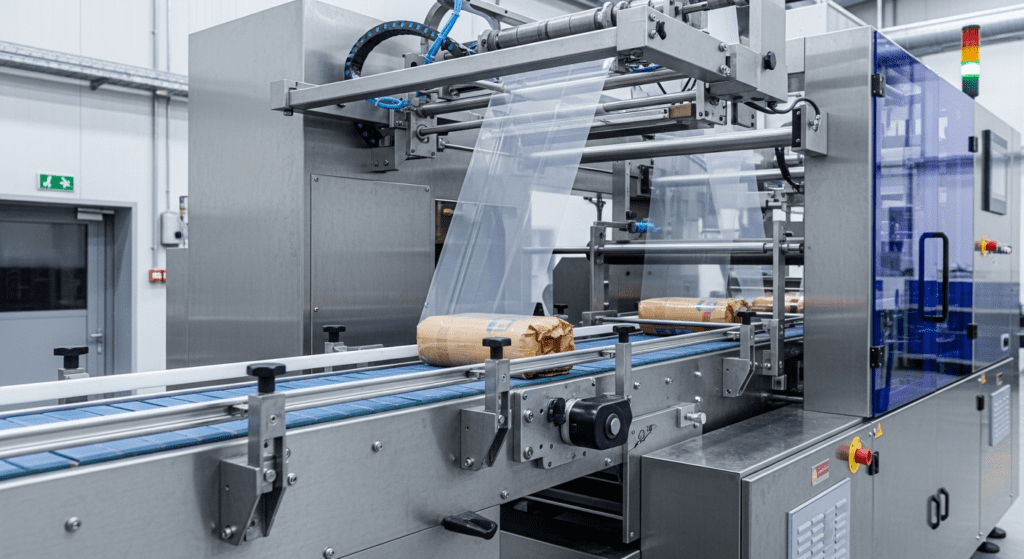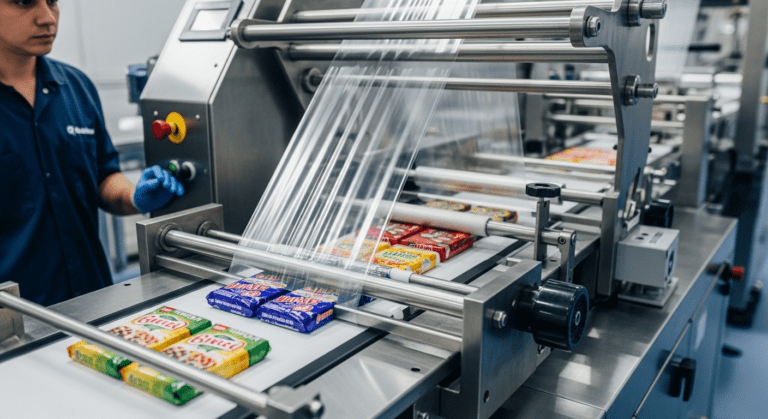Flow wrapping costs typically range from $15,000 to $200,000 for new machines, while used equipment runs $5,000 to $100,000.
The key insight is: your total investment depends on production speed, features, and ongoing operational costs like materials, labor, and maintenance. Small businesses often start with entry-level machines around $15,000-$30,000, while high-speed industrial systems can exceed $150,000.
The most important factor? Match your machine to your production needs – buying too much or too little capacity directly impacts your profitability.

Common Flow Wrapping Machine Price Ranges (New & Used)
| Machine Type | New Price | Used Price | Speed (ppm) | Best For |
|---|---|---|---|---|
| Entry-Level Manual | $10,000-25,000 | $5,000-15,000 | 30-60 | Small bakeries, startups |
| Semi-Automatic | $25,000-50,000 | $15,000-30,000 | 60-150 | Growing businesses |
| Automatic Standard | $50,000-100,000 | $30,000-60,000 | 150-300 | Medium production |
| High-Speed Industrial | $100,000-250,000 | $60,000-150,000 | 300-600 | Large manufacturers |
| Custom/Specialized | $150,000-500,000 | $80,000-250,000 | Variable | Specific industries |
Most importantly: used machines cost 40-60% less but may have higher maintenance costs and shorter warranties.
The Factors That Affect the Price of Flow Wrapping Machine
Your flow wrapping investment goes far beyond the initial machine purchase. Understanding these cost factors helps you budget accurately and avoid surprises.
Consumables
Film costs dominate your ongoing expenses.
Basic polyethylene film runs $0.01-0.03 per package. Specialty films like biodegradable or printed materials cost $0.03-0.08 per package.
Calculate your annual film cost: packages per day × film cost × working days. A bakery wrapping 5,000 items daily spends $15,000-45,000 yearly on film alone.
Labor Costs
Operating a flow wrapper requires 1-2 trained operators per shift.
Entry-level machines need more hands-on attention, while automated systems reduce labor needs by 50-70%. Factor in $15-25 per hour for operators, plus training time and benefits.
Smart automation features like auto-feeding and quality inspection systems can pay for themselves through labor savings within 12-18 months.
Maintenance and Downtime
Regular maintenance costs average $2,000-$5,000 annually.
This includes replacement parts (sealing bars, cutting blades, sensors), lubricants, and technician visits. Preventive maintenance schedules reduce unexpected breakdowns by 80%.
Each hour of unplanned downtime costs $500-$2,000 in lost production. Quality machines from reputable brands typically achieve 95%+ uptime rates.
Energy Consumption
Flow wrappers consume 3-15 kW per hour depending on size and features.
At average industrial electricity rates, expect $200-$800 monthly in power costs.
Features
Essential features add $5,000-20,000 each to base price.
Key features that affect cost include:
- Servo motors vs. mechanical drives (+$10,000-$20,000)
- Touch screen controls (+$5,000-$10,000)
- Product handling systems (+$15,000-$30,000)
- Modified atmosphere packaging capability (+$20,000-$40,000)
- Vision inspection systems (+$10,000-$25,000)
Speed
Production speed directly determines machine cost.
Each 100 packages-per-minute increase adds roughly $20,000-30,000 to price. But faster isn’t always better—running below capacity improves reliability and seal quality.
Match speed to your needs.
A machine running at 70% capacity lasts longer and produces better seals than one pushed to its limits.
Brands
Premium brands cost 20-40% more but deliver value through reliability.
Industry leaders like Bosch, Fuji, and Ulma charge $80,000-200,000 for standard machines. Lesser-known brands offer similar specs for $50,000-120,000. The difference? Uptime, support, and resale value.
Top-tier brands maintain 98%+ uptime. Budget brands average 85-90%. For high-volume operations, that reliability difference is worth the premium. Parts availability and technical support also favor established manufacturers.


